a&e features
Unraveling mystery of the Kilbourne Place memorial stones
Three gay men lived in this Mount Pleasant neighborhood before dying of AIDS
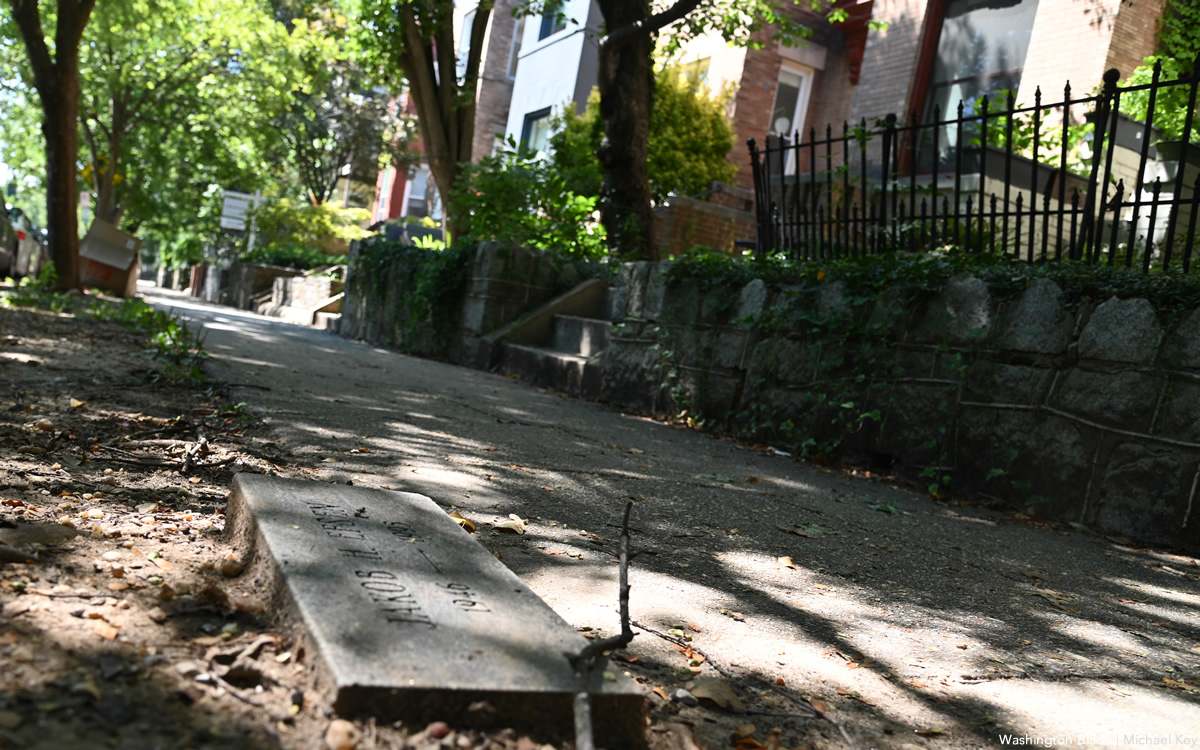
Walking down Kilbourne Place is like stepping into another world. The quiet street lined with row homes is a far cry from the hustle and bustle of Mount Pleasant Street. Mount Pleasant is a village within a city with a thriving El Salvadoran population, long-term residents, and newcomers such as myself. On any given day, Purple Patch is serving up sizzling plates of Sisig and the 43 bus is whizzing its way on its journey to the Kennedy Center. On Kilbourne Place, the sound of sizzling pork and the loud hum of the Metrobus can be heard. Within this little slice of serenity, there are three men that I’ve become acquainted with: Robert Rockerhousen, Jakob Efsen and Charles Winney.
On Aug. 18, 2022, my dear friend Courtney decided that it was a good idea to take a walk around the neighborhood after a long day’s work. As we took a right on Lamont Street to walk up Kilbourne, I decided to slow my pace and lag behind. When I caught up to Courtney, she was standing in front of 1755 Kilbourne Place staring at a patch of grass.
I looked down at what caught her eye. It was a headstone with the name Robert Rockershousen and the years 1959-1998 etched onto it. We both sat there and scratched our heads at this find. Without exchanging words, I stepped a couple of paces to the left and found Jakob Efsen and Charles Winney’s headstones. Courtney and I reconvened back at Robert’s stone and we started to exchange ideas about what these headstones could be.
My first thought was that these were trees planted as a memorial but Courtney reminded me that there were no trees. We said that these could be stones for beloved family pets but the names sounded too human. Getting caught up in trying to find out why headstones would be in this quiet neighborhood, we forgot the years that were etched into them. We both settled on the stones being a memorial for slaves since an enslaved burial ground was found not too far away in Adams Morgan. Now that the mosquitoes were biting at every inch of exposed skin, we settled on this rationale and walked away. Before leaving, I decided to snap a picture.
One glass of wine and a few hours later, I pulled out my phone and took a look at the headstone. The enslaved memorial theory was quickly discarded because I saw the year 1998 clear as day. Doing what most people in my age group do when we’re looking for information, I turned to the Internet. I posted on the r/washingtondc subreddit hoping to ask residents if they knew anything about these stones. The commenters on that post were as confused as I was. Knowing that I needed more information, I walked back down the street the following day and took pictures of Jakob and Charles’s stone. It was on this second trip back and actually paying attention to the stones that a thought started to form.
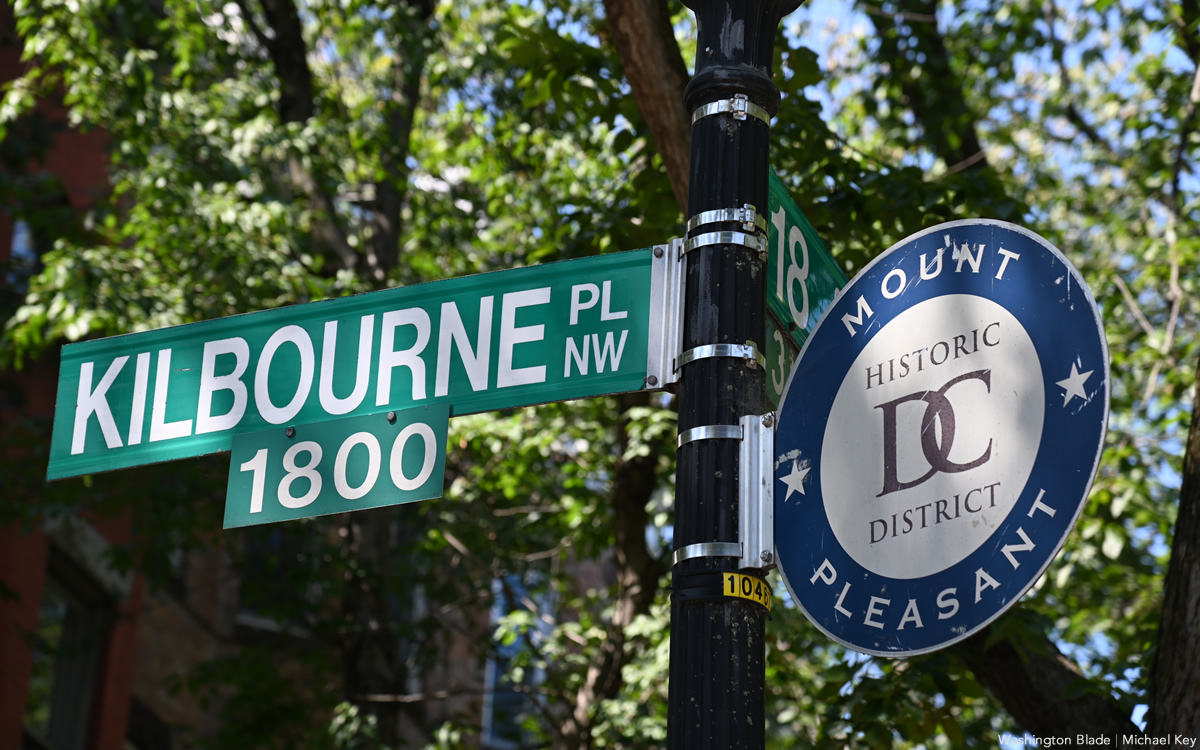
All three of the stones were in honor of men who passed away in the mid-to-late 1990s who were all under 50 years of age. I decided to take another shot at the Internet and back on the r/washingtondc subreddit I made a post soliciting the help of elders in the area’s LGBTQ community. As I was waiting for comments to roll in, I was anxiously checking my phone and refreshing the feed hoping that someone somewhere had answers. No one could say who, what, or when the stones were placed on Kilbourne Place but a few provided some valuable insight on the neighborhood and a few told me to check the Washington Blade’s obituary section with my library card. That night, I spent hours going through each issue in the 1998 archives until I landed on the Nov. 13, 1998 issue. There in black and white was Robert and his cause of death was listed as complications from AIDS.
I went back into the archives and started scrolling through 1996 until I got to July 26, 1996 where I found Charles. In black and white was the cause of death due to complications of AIDS. It took a while for me to find Jakob’s obituary but it was found through the NAMES Project AIDS Memorial Quilt. Even though his cause of death wasn’t explicitly listed as complications from AIDS on his obituary, I knew what that 3×6 panel represented. Here before me were three men who were gay and died from AIDS. At first, my looking into these headstones was something to satiate my curiosity. I was still relatively new to Mount Pleasant and I wanted to know every little thing about the place I now call home. I did not know that this undertaking would become deeply personal for me.
I didn’t fully embrace and accept myself until I turned 25. Growing up, I had conflicting feelings about my sexuality and identity. As young as elementary school I knew I had an attraction to girls and I preferred to present more masculine. Among my friend group, I preferred to be called Tee because Tiana never sounded right to my ears. It wasn’t until adolescence that I also realized I had an attraction to boys. Throughout my adolescent and early adult life, I had visible relationships with men and closeted relationships with women. It was already programmed that there was a “wrongness” within me. I was mocked for my tomboyish appearance. I couldn’t maintain friendships with other girls because they would be immediately labeled as dykes. In college, the dean of my sorority indicated that she would feel “uncomfortable” changing in front of me, implying that there is something inherently predatory about my sexuality.
The closet is where I stayed until June of 2022. Around that time, the walls of the closet started to close in on me and a change needed to happen. I chopped off all of my hair, threw away my feminine clothing, and became Tee again. While this newfound freedom was liberating, there was also a deep sense of regret. When I went to Pride that year I saw a beautiful and vibrant community. A community that I knew nothing about and was afraid of my whole life. Stumbling upon Robert, Charles, and Jake’s headstones as a newly out queer person allowed me an opportunity to learn about a community that I deprived myself of in favor of trying to be “normal.”
I immediately got to work researching everything I could about the men. No longer was finding out the person or entity that placed the headstones an important part of my research. The most important thing was telling the stories of these three men and the lives that they led. Jakob was the first of the three that I started researching. There was already quite a bit of information on him due to his quilt panel. On his panel, there was a pair of cowboy boots and three flags. The cowboy boots represented his love for square dancing. He was a proud member of DC Lambda Squares, which is the area’s LGBTQ square dancing group. DC Lambda Squares members made Jakob’s panel. The three flags represented places that were deeply personal to him. Denmark represents the place he was born. Sweden represents the nationality of his parents, and South Korea represents where Jake served and lived during his time in the PeaceCorps.
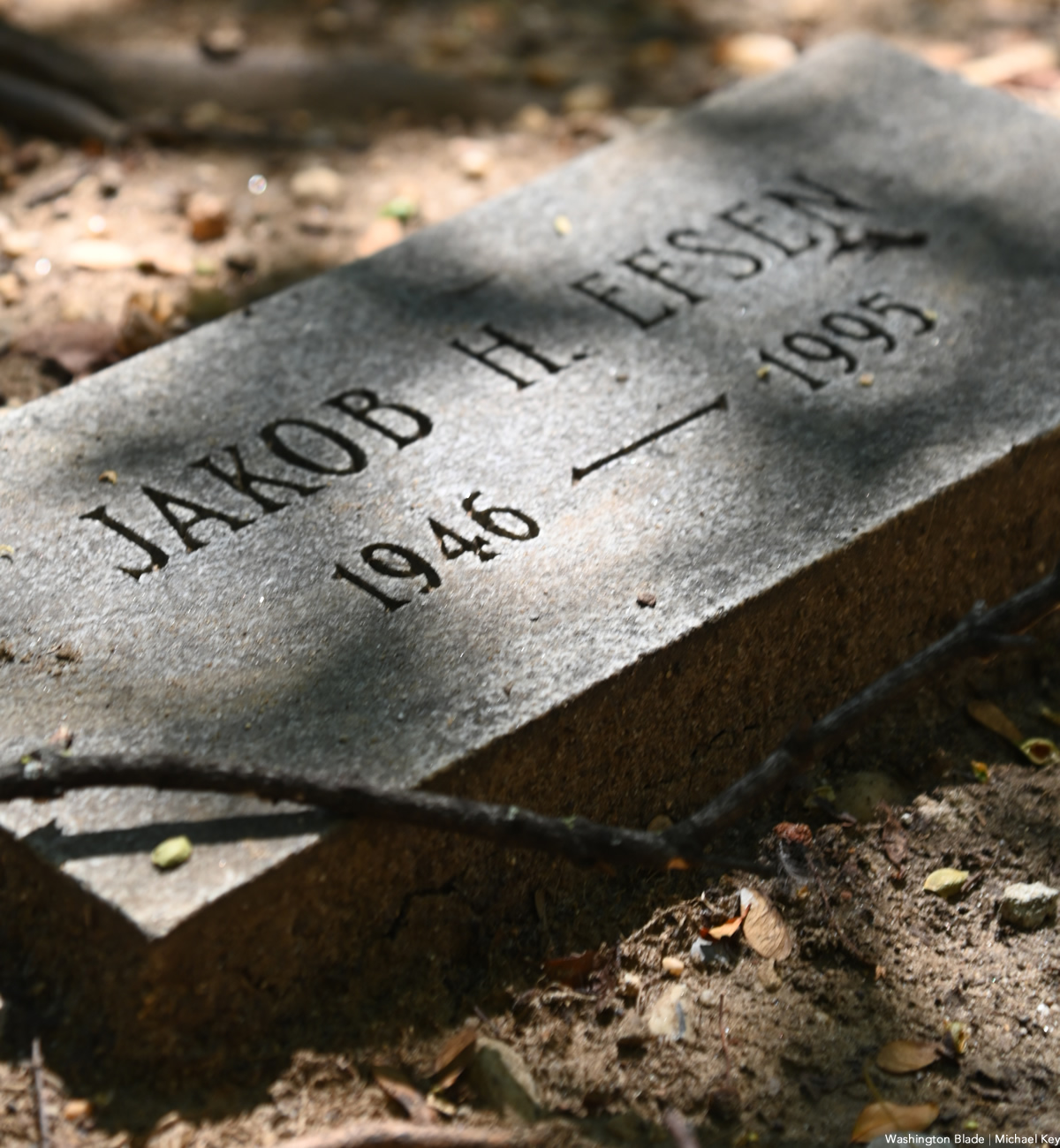
Jakob Efsen was born on Feb. 5, 1946 in Denmark. At some point in his childhood, he and his family relocated to Middletown Township, N.J., where he stayed until adulthood. Upon completion of university, he volunteered for the PeaceCorps where he served as a tuberculosis control volunteer in South Korea. In doing research about Jakob, I found a Facebook group of PeaceCorps volunteers who served in Korea. One of his friends, Neil Landreville with whom I had the pleasure speaking, was in K group 13 with Jakob between 1970-1972.
On June 23, 2023, I had the pleasure of speaking with Neil. Neil is now 77 years old and a retired HIV nurse living in New York City. He has a certain youthfulness and brightness to his voice that immediately endears you to him. We stayed on the phone for more than an hour talking about what he knew about Jake and trading stories of our careers in healthcare. Neil met Jake in San Jose where they were roommates for three days before PeaceCorps training in Hawaii. Neil first noticed that Jake was very tall and had an enthusiasm for life. He expressed that the people who knew Jake were immediately taken in by his generosity.
In the weeks they had to learn Korean and how to administer care to people with tuberculosis, Neil fondly remembers how Jake liked to take photos of flowers. Jake went on to become staff for PeaceCorps following the completion of his volunteer term. Being so inspired by the work he did in Korea, Jake came to the DMV area and worked as a tuberculosis case manager in Prince George’s County. Neil expressed that the same reason he worked in the Bronx during the height of the AIDS epidemic is the same reason Jake took on the job in Prince George’s County — he wanted to work directly with the people.
Another fascinating bit about Jake is that he liked to write letters to the editor in response to stories he read in the local newspaper. He was very vocal about his feelings on former Mayor Marion Barry during his drug scandal. He was also vocal about road safety and I have to believe he was passionate about it because he liked to ride his bicycle throughout the neighborhood. Another piece that spoke to me that I remembered when speaking to Neil is one from the Aug. 14, 1987 edition of The Washington Times. The piece was titled “AIDS: The Situation That the U.S. Faces.”
Six years into the AIDS epidemic, the crisis was being ignored by the government. Then-President Ronald Reagan did not mention the word AIDS publicly for years until after his Hollywood friend Rock Hudson came out as gay and revealed that he was living with AIDS. The government was so adamant about not mentioning AIDS that the topic was met with laughter and homophobic remarks in a 1982 press conference in which former Press Secretary Larry Speakes asked reporter Lester Kinsolving if he had AIDS. It wasn’t until the late 1980s when the AIDS death toll was nearing hundreds of thousands did the government expand funding for research and drug development.
In that time of governmental neglect, misinformation, and homophobia, Jake posed a challenge in his piece. He stated, “If Mr. Sobaran thinks the heterosexual population of this nation is safe from the AIDS infection, I suggest he study the incidence of genital herpes in the United States.” In talking with Neil, it was discovered that Jakob already knew he was HIV positive as early as 1990. Neil recounted a visit to D.C. to Jakob’s home where he stayed with his partner. He recalls Jake mentioning that he was taking Bactrim as a prophylactic for PCP (pneumocystis pneumonia). Even though Jake was living with HIV, he continued to work as a tuberculosis case manager all the way up until a couple of weeks before his passing.
Hearing that detail about Jake impressed and also flustered me. Tuberculosis is one of the many opportunistic infections for people living with compromised immune systems. I asked Neil if he was worried about Jake working such a job in his condition and he responded with “that was Jake.” Jakob died on June 5, 1995 with his long-term partner Bradford Jewett by his side. Neil went to the subsequent funeral service where he noticed that it was attended by a majority of his D.C. friends. Still not having any information on Charles and Robert and knowing that they were neighbors, I asked Neil if it would be OK if I sent him photos of Charles and Robert to see if he remembers them at Jake’s service. Unfortunately, he did not recall seeing them there.
Feeling at peace with what I found out about Jake, I started to look into Charles. Charles Winney was born on March 2, 1956 in Saratoga Springs, N.Y., where he lived until moving to Baltimore to attend Johns Hopkins University in 1974 to study to be a pharmacist. It’s unclear how far he made it at Hopkins because he eventually went to the Howard University School of Pharmacy to continue his studies. In looking into Charles’s background, I wanted to find a better photo other than the black and white one used for his obituary. I scoured The Bison (Howard University’s yearbook) looking for any indication of Charles but he wasn’t in there. I continued searching for anything that could lead me to a photo of Charles and a Google search of his name led to a resume.
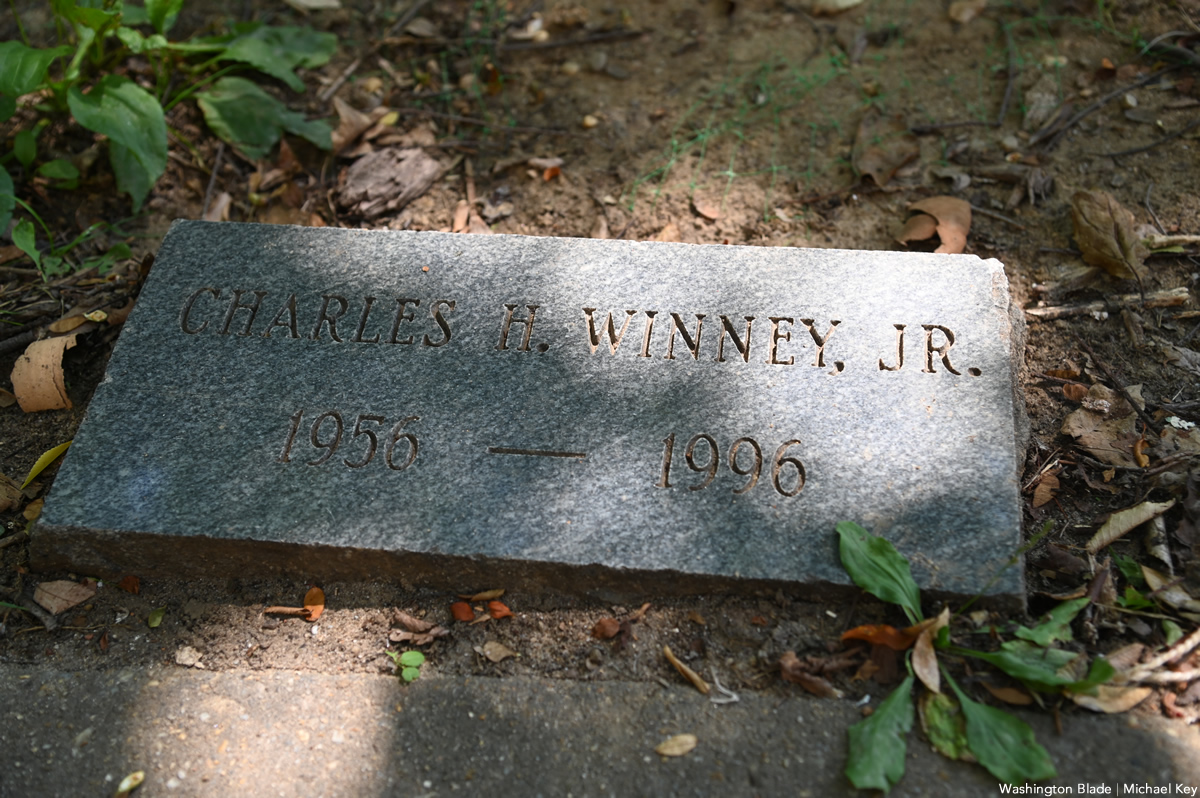
The resume was for a pharmaceutical researcher based out of Kansas. In the section where he listed the people he mentored, Charles was one of his interns in the summer of 1986 and he was listed as a senior. I went back to the 1986 and 1987 issue of The Bison looking for a photo of him and again, there was no photo. It is unclear whether Charles completed his studies at Howard but he worked for the pharmacy at George Washington University Hospital before working at Fidia Pharmaceuticals before retiring on disability in 1993. Charles also worked in the healthcare industry. Unfortunately, not much is known about Charles at this point. I reached out for information to various people but none have yet to respond. Charles passed away on July 11, 1996, with his partner Larry Martin by his side.
While waiting for more information on Charles and Robert, I began to ponder a little bit more about Charles because just like me, he lived at the intersection of Blackness and queerness. That intersection was something that I had to reconcile within myself. In my community, it’s not uncommon to hear someone mention that homosexuality isn’t “African” or that homosexuality is an “agenda” being pushed by the white mainstream media to destroy the Black family structure. The thought that I struggled with through all these years was that by accepting my queerness, I too would be trading in my Blackness. The Black community is a community that had to build itself from the ground up. Through forced migration, we lost most of our native tongue, culture, and history. Some of those have been retained and passed down, which is evident in our music or cultural practices (i.e. jumping the broom at weddings) but it has been blended with the language, culture, and customs by the same people who kidnapped us from Africa.
Christianity was used as a way to instill subservience in slaves. Slave masters and captors frequently quoted Ephesians 6:5 to justify their complicity in bondage to human beings. “Slaves, obey your earthly masters with respect and fear, and with sincerity of heart, just as you would obey Christ,” the verse said. The Black church has become a pillar of the community and incubated the Civil Rights Movement. The Black church is also the same institution that uses Leviticus 20:13 to shun their very own. “If a man lieth with mankind as he lieth with a woman, both of them have committed an abomination,” the verse says.
Even though the Black church is currently experiencing drops in attendance, not too many Black people are far removed from the influence the church has had on our people and unfortunately, homophobia has been one of its influences.
With this history in perspective, in certain parts of the Black community, queerness is viewed as giving into white supremacy where males are seen as giving up their masculinity for a more subservient, feminine position. The women are viewed as wanting to become men in order to escape gender-based oppression and only in finding the “right man,” will the woman return to her “natural” position. Being a Black gay man in the 70s, 80s, and 90s, I wonder how Charles navigated these social issues. For Charles to have been out and in a long-term relationship during those times is a testament to his bravery.
In the process of digging through public records trying to find Charles, an unexpected call came in. Neil forwarded my request for information on Jake to a fellow PeaceCorps friend, Susan Pawlowsky. While she did not know Jake, she does have a love for genealogy. I asked her if she could use her skills to help me find information on Charles and Robert. She agreed and in the information that she sent, she sent the information for Robert’s mother. Acting on faith, I penned a letter and dropped it in the mail to Mrs. Rockerhousen.
On July 1, 2023, I had the pleasure of speaking with Arleen Rockerhousen. I expected to answer questions about my motivations in wanting to know information about her but I was met with a surprisingly sweet and pleasant voice. I told her to tell me what Robert was like and the type of child that he was.
Robert Rockerhousen was born on Aug. 17, 1959 in Michigan. Mrs. Rockerhousen explained that he had a good group of friends growing up but she would often find Robert in his room studying maps. Robert had wanderlust and had wanted to see the world from an early age. This passion for travel was ignited even further when he got a job at a local AAA office in high school where he again was surrounded by maps. After high school, Robert went to the University of Michigan Ann Arbor where he had an internship with Victoria University in Toronto. He graduated with a bachelor’s degree in 1981. Upon completion of his undergraduate studies, Robert took whatever money he had and traveled around Europe until his money ran out.
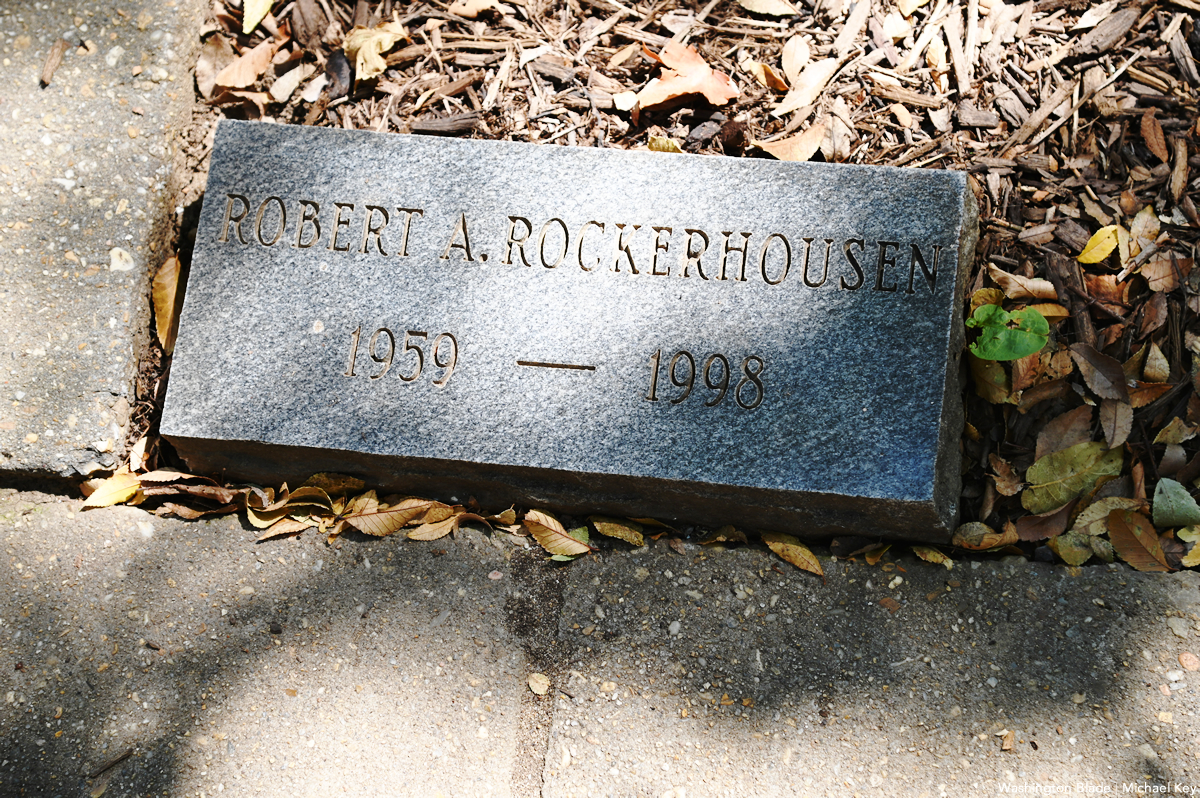
When Robert came back to the states, he worked for American Express Travel Related Services until he eventually landed a job at the World Bank as a tariff specialist in Washington, D.C. Mrs. Rockerhousen was familiar with his group of friends in D.C. I found it quite funny when she mentioned that one of his friends was a cartographer due to his love of maps when he was younger. She also mentioned that she was familiar with Larry and Charles. In her recollection of events, she stated that the property on 1755 Kilbourne Place was not Robert’s primary residence. She stated that it was co-owned by him and his longtime friend John Koran. In a brief exchange with Mr. Koran, it was mentioned that he and Robert did indeed own and live on the property until Robert fell ill and eventually sold it to live with his partner Luis in the Shaw neighborhood.
Mrs. Rockerhousen mentioned that Robert, Charles, and Larry were very close and they enjoyed her cooking whenever she would come over. She mentioned that their favorite dish was her German lasagna. She isn’t quite sure how Robert, Charles, and Larry became friends but she remembers them very fondly. While listening to her reminisce about her son, I did not want to talk about HIV. I grew up in a post antiretroviral world due to being born in late 1996. I never knew a time when HIV was more than just a chronic manageable condition. In researching the AIDS epidemic to gain perspective on the times in which Robert, Charles, and Jake lived, just seeing footage and pictures was more than gutting in and of itself. I could not imagine being a parent and having to witness your child die before their time.
When the topic of HIV came up in regards to her son, Mrs. Rockerhousen spoke with poise and clarity. She mentioned that one of her biggest regrets when it came to Robert was that he couldn’t feel he could come out to her and their family. It wasn’t until Robert fell ill that he came out to them. Nevertheless, Mrs. Rockerhousen was very supportive of Robert and showed up when he needed her. On Nov. 6, 1998, Robert passed away at the age of 39 with his partner Luis Schunk by his side. Mrs. Rockerhousen mentioned that Charles’s partner Larry Martin held a wake for him inside of his house. I tried reaching out to Larry in order to find out more information on Charles, Robert, and if there was any connection to Jake but as of now there has been no response.
I still don’t know who placed those stones on Kilbourne Place and maybe I will never know. At first, I felt like Nancy Drew trying to unravel this mystery but when the lives of these three men unfolded in front of me, the mystery had to take a backseat. In front of me were three men who lived dynamic lives in spite of the AIDS epidemic. Robert, Charles, and Jake lived in their truths in a time when living in your truth could be met with scorn. Living in your truth meant having to witness the government neglect you as a virus was overtaking your community. Living in your truth meant watching friends and loved ones die but still finding community within each other.
When Mrs. Rockerhousen mentioned Larry having Robert’s wake in his own home, that touched me in a way that I could not imagine. It showed the love between friends and between members of a community. That is what these stones represent. Whoever placed these stones on this quiet stretch of street in the middle of Mount Pleasant loved Robert, Charles, and Jake enough to remember them where they felt the most comfortable. They were remembered in a place where they could be free without the prying eyes of the public. They were remembered at home, where the heart truly lives.
a&e features
Eastern Shore chef named James Beard Finalist
Harley Peet creates inventive food in an inclusive space

In a small Eastern Shore town filled with boutiques, galleries, and the occasional cry of waterfowl from the Chesapeake, Chef Harley Peet is most at home. In his Viennese-inflected, Maryland-sourced fine-dining destination Bas Rouge, Peet draws from his Northern Michigan upbringing, Culinary Institute of America education, and identity as a gay man, for inspiration.
And recently, Peet was named a James Beard Finalist for Best Chef: Mid-Atlantic – the first “Best Chef: Mid-Atlantic” finalist representing the Eastern Shore.
Peet, after graduation from the Culinary Institute of America, took a position as sous chef at Tilghman Island Inn, not far from Bas Rouge. Falling in love with the Eastern Shore, he continued his passion for racing sailboats, boating, gardening, and fishing, and living his somewhat pastoral life as he opened Bas Rouge in 2016 as head chef, a restaurant part of the Bluepoint Hospitality group, which runs more than a dozen concepts in and around Easton, Md.
Coming from a rural area and being gay, Peet knew he had his work cut out for him. He was always aware that the service and hospitality industry “can be down and dirty and rough.”
Now as a leader in the kitchen, he aims to “set a good example, and treat people how I want to be treated. I also want to make sure if you’re at our establishment, I’m the first to stand up and say something.”
The Bas Rouge cuisine, he says, is Contemporary European. “I’m inspired by old-world techniques of countries like Austria, Germany, and France, but I love putting a new spin on classic dishes and finding innovative ways to incorporate the bounty of local Chesapeake ingredients.”
His proudest dish: the humble-yet-elevated Wiener Schnitzel. “It is authentic to what one would expect to find in Vienna, down to the Lingonberries.” From his in-house bakery, Peet dries and grinds the housemade Kaiser-Semmel bread to use as the breadcrumbs.
Peet works to support the LGBTQ community inside and outside of the kitchen. “I love that our Bluepoint Hospitality team has created welcoming spaces where our patrons feel comfortable dining at each of our establishments. Our staff have a genuine respect for one another and work together free of judgment.”
Representing Bluepoint, Peet has participated in events like Chefs for Equality with the Human Rights Campaign, advocating for LGBTQ rights.
At Bas Rouge, Peet brings together his passion for inclusion steeped in a sustainability ethic. He sees environmental stewardship as a way of life. Peet and his husband have lived and worked on their own organic farm for several years. Through research in Europe, he learned about international marine sourcing. Witnessing the impacts of overfishing, Peet considers his own role in promoting eco-friendly practices at Bas Rouge. To that end, he ensures responsible sourcing commitments through his purveyors, relationships that have helped create significant change in how people dine in Easton.
“I have built great relationships in the community and there’s nothing better than one of our long-standing purveyors stopping in with a cooler of fresh fish from the Chesapeake Bay. This goes especially for catching and plating the invasive blue catfish species, which helps control the species’ threat to the local ecosystem.
Through his kitchen exploits, Peet expressed a unique connection to another gay icon in a rural fine-dining restaurant: Patrick O’Connell, of three Michelin starred Inn at Little Washington. In fact, Peet’s husband helped design some of O’Connell’s kitchen spaces. They’ve both been able to navigate treacherous restaurant-industry waters, and have come out triumphant and celebrated. Of O’Connell, Peet says that he “sees [his restaurants] as canvas, all artistry, he sees this as every night is a show.” But at the same time, his “judgment-free space makes him a role model.”
Being in Easton itself is not without challenges. Sourcing is a challenge, having to either fly or ship in ingredients, whereas urban restaurants have the benefit of trucking, he says. The small town “is romantic and charming,” but logistics are difficult – one of the reasons that Peet ensures his team is diverse, building in different viewpoints, and also “making things a hell of a lot more fun.”
Reflecting on challenges and finding (and creating) space on the Eastern Shore, Peet confirmed how important it was to surround himself with people who set a good example, and “if you don’t like the way something is going … move on.”
a&e features
What to expect at the 2024 National Cannabis Festival
Wu-Tang Clan to perform; policy discussions also planned

(Editor’s note: Tickets are still available for the National Cannabis Festival, with prices starting at $55 for one-day general admission on Friday through $190 for a two-day pass with early-entry access. The Washington Blade, one of the event’s sponsors, will host a LGBTQIA+ Lounge and moderate a panel discussion on Saturday with the Mayor’s Office of LGBTQ Affairs.)
With two full days of events and programs along with performances by Wu-Tang Clan, Redman, and Thundercat, the 2024 National Cannabis Festival will be bigger than ever this year.
Leading up to the festivities on Friday and Saturday at Washington, D.C.’s RFK Stadium are plenty of can’t-miss experiences planned for 420 Week, including the National Cannabis Policy Summit and an LGBTQ happy hour hosted by the District’s Black-owned queer bar, Thurst Lounge (both happening on Wednesday).
On Tuesday, the Blade caught up with NCF Founder and Executive Producer Caroline Phillips, principal at The High Street PR & Events, for a discussion about the event’s history and the pivotal political moment for cannabis legalization and drug policy reform both locally and nationally. Phillips also shared her thoughts about the role of LGBTQ activists in these movements and the through-line connecting issues of freedom and bodily autonomy.
After D.C. residents voted to approve Initiative 71 in the fall of 2014, she said, adults were permitted to share cannabis and grow the plant at home, while possession was decriminalized with the hope and expectation that fewer people would be incarcerated.
“When that happened, there was also an influx of really high-priced conferences that promised to connect people to big business opportunities so they could make millions in what they were calling the ‘green rush,'” Phillips said.
“At the time, I was working for Human Rights First,” a nonprofit that was, and is, engaged in “a lot of issues to do with world refugees and immigration in the United States” — so, “it was really interesting to me to see the overlap between drug policy reform and some of these other issues that I was working on,” Phillips said.
“And then it rubbed me a little bit the wrong way to hear about the ‘green rush’ before we’d heard about criminal justice reform around cannabis and before we’d heard about people being let out of jail for cannabis offenses.”
“As my interests grew, I realized that there was really a need for this conversation to happen in a larger way that allowed the larger community, the broader community, to learn about not just cannabis legalization, but to understand how it connects to our criminal justice system, to understand how it can really stimulate and benefit our economy, and to understand how it can become a wellness tool for so many people,” Phillips said.
“On top of all of that, as a minority in the cannabis space, it was important to me that this event and my work in the cannabis industry really amplified how we could create space for Black and Brown people to be stakeholders in this economy in a meaningful way.”

“Since I was already working in event production, I decided to use those skills and apply them to creating a cannabis event,” she said. “And in order to create an event that I thought could really give back to our community with ticket prices low enough for people to actually be able to attend, I thought a large-scale event would be good — and thus was born the cannabis festival.”
D.C. to see more regulated cannabis businesses ‘very soon’
Phillips said she believes decriminalization in D.C. has decreased the number of cannabis-related arrests in the city, but she noted arrests have, nevertheless, continued to disproportionately impact Black and Brown people.
“We’re at a really interesting crossroads for our city and for our cannabis community,” she said. In the eight years since Initiative 71 was passed, “We’ve had our licensed regulated cannabis dispensaries and cultivators who’ve been existing in a very red tape-heavy environment, a very tax heavy environment, and then we have the unregulated cannabis cultivators and cannabis dispensaries in the city” who operate via a “loophole” in the law “that allows the sharing of cannabis between adults who are over the age of 21.”
Many of the purveyors in the latter group, Phillips said, “are looking at trying to get into the legal space; so they’re trying to become regulated businesses in Washington, D.C.”
She noted the city will be “releasing 30 or so licenses in the next couple of weeks, and those stores should be coming online very soon” which will mean “you’ll be seeing a lot more of the regulated stores popping up in neighborhoods and hopefully a lot more opportunity for folks that are interested in leaving the unregulated space to be able to join the regulated marketplace.”
National push for de-scheduling cannabis
Signaling the political momentum for reforming cannabis and criminal justice laws, Wednesday’s Policy Summit will feature U.S. Sens. Raphael Warnock (D-Ga.), Jeff Merkley (D-Ore.), Elizabeth Warren (D-Mass.), and Chuck Schumer (D-N.Y.), the Senate majority leader.
Also representing Capitol Hill at the Summit will be U.S. Congresswoman Eleanor Holmes Norton (D-D.C.) and U.S. Reps. Earl Blumenauer (D-Ore.) and Barbara Lee (D-Calif.) — who will be receiving the Supernova Women Cannabis Champion Lifetime Achievement Award — along with an aide to U.S. Rep. David Joyce (R-Ohio).
Nationally, Phillips said much of the conversation around cannabis concerns de-scheduling. Even though 40 states and D.C. have legalized the drug for recreational and/or medical use, marijuana has been classified as a Schedule I substance since the Controlled Substances Act was passed in 1971, which means it carries the heftiest restrictions on, and penalties for, its possession, sale, distribution, and cultivation.
The U.S. Department of Health and Human Services formally requested the drug be reclassified as a Schedule III substance in August, which inaugurated an ongoing review, and in January a group of 12 Senate Democrats sent a letter to the Biden-Harris administration’s Drug Enforcement Administration urging the agency to de-schedule cannabis altogether.
Along with the Summit, Phillips noted that “a large contingent of advocates will be coming to Washington, D.C. this week to host a vigil at the White House and to be at the festival educating people” about these issues. She said NCF is working with the 420 Unity Coalition to push Congress and the Biden-Harris administration to “move straight to de-scheduling cannabis.”
“This would allow folks who have been locked up for cannabis offenses the chance to be released,” she said. “It would also allow medical patients greater access. It would also allow business owners the chance to exist without the specter of the federal government coming in and telling them what they’re doing is wrong and that they’re criminals.”
Phillips added, however, that de-scheduling cannabis will not “suddenly erase” the “generations and generations of systemic racism” in America’s financial institutions, business marketplace, and criminal justice system, nor the consequences that has wrought on Black and Brown communities.
An example of the work that remains, she said, is making sure “that all people are treated fairly by financial institutions so that they can get the funding for their businesses” to, hopefully, create not just another industry, but “really a better industry” that from the outset is focused on “equity” and “access.”
Policy wonks should be sure to visit the festival, too. “We have a really terrific lineup in our policy pavilion,” Phillips said. “A lot of our heavy hitters from our advocacy committee will be presenting programming.”
“On Saturday there is a really strong federal marijuana reform panel that is being led by Maritza Perez Medina from the Drug Policy Alliance,” she said. “So that’s going to be a terrific discussion” that will also feature “representation from the Veterans Cannabis Coalition.”
“We also have a really interesting talk being led by the Law Enforcement Action Partnership about conservatives, cops, and cannabis,” Phillips added.
Cannabis and the LGBTQ community
“I think what’s so interesting about LGBTQIA+ culture and the cannabis community are the parallels that we’ve seen in the movements towards legalization,” Phillips said.
The fight for LGBTQ rights over the years has often involved centering personal stories and personal experiences, she said. “And that really, I think, began to resonate, the more that we talked about it openly in society; the more it was something that we started to see on television; the more it became a topic in youth development and making sure that we’re raising healthy children.”
Likewise, Phillips said, “we’ve seen cannabis become more of a conversation in mainstream culture. We’ve heard the stories of people who’ve had veterans in their families that have used cannabis instead of pharmaceuticals, the friends or family members who’ve had cancer that have turned to CBD or THC so they could sleep, so they could eat so they could get some level of relief.”
Stories about cannabis have also included accounts of folks who were “arrested when they were young” or “the family member who’s still locked up,” she said, just as stories about LGBTQ people have often involved unjust and unnecessary suffering.
Not only are there similarities in the socio-political struggles, Phillips said, but LGBTQ people have played a central role pushing for cannabis legalization and, in fact, in ushering in the movement by “advocating for HIV patients in California to be able to access cannabis’s medicine.”
As a result of the queer community’s involvement, she said, “the foundation of cannabis legalization is truly patient access and criminal justice reform.”
“LGBTQIA+ advocates and cannabis advocates have managed to rein in support of the majority of Americans for the issues that they find important,” Phillips said, even if, unfortunately, other movements for bodily autonomy like those concerning issues of reproductive justice “don’t see that same support.”
a&e features
Juliet Hawkins’s music defies conventional categorization
‘Keep an open mind, an open heart, and a willingness to evolve’
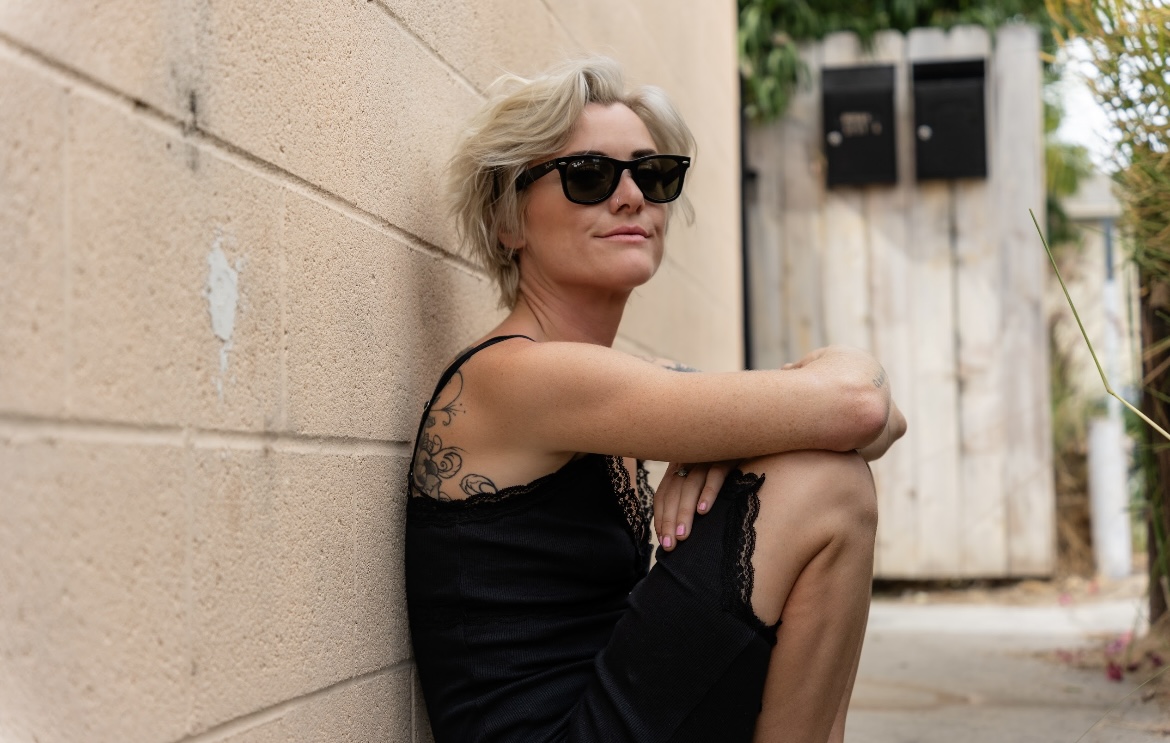
LONG BEACH, Calif. – Emerging from the dynamic music scene of Los Angeles, Juliet Hawkins seamlessly integrates deeply soulful vocals with contemporary production techniques, crafting a distinctive sound that defies conventional categorization.
Drawing inspiration from the emotive depth of Amy Winehouse and weaving together elements of country, blues, and pop, Hawkins’ music can best be described as a fusion–perhaps best termed as soulful electronica. Yet, even this characterization falls short, as Hawkins defines herself as “a blend of a million different inspirations.”
Hawkins’s musical palette mirrors her personae: versatile and eclectic. Any conversation with Hawkins makes this point abundantly clear. She exhibits the archetype of a wild, musical genius while remaining true to her nature-loving, creative spirit. Whether recording in the studio for an album release, performing live in a studio setting, or playing in front of a live audience, Hawkins delivers her music with natural grace.
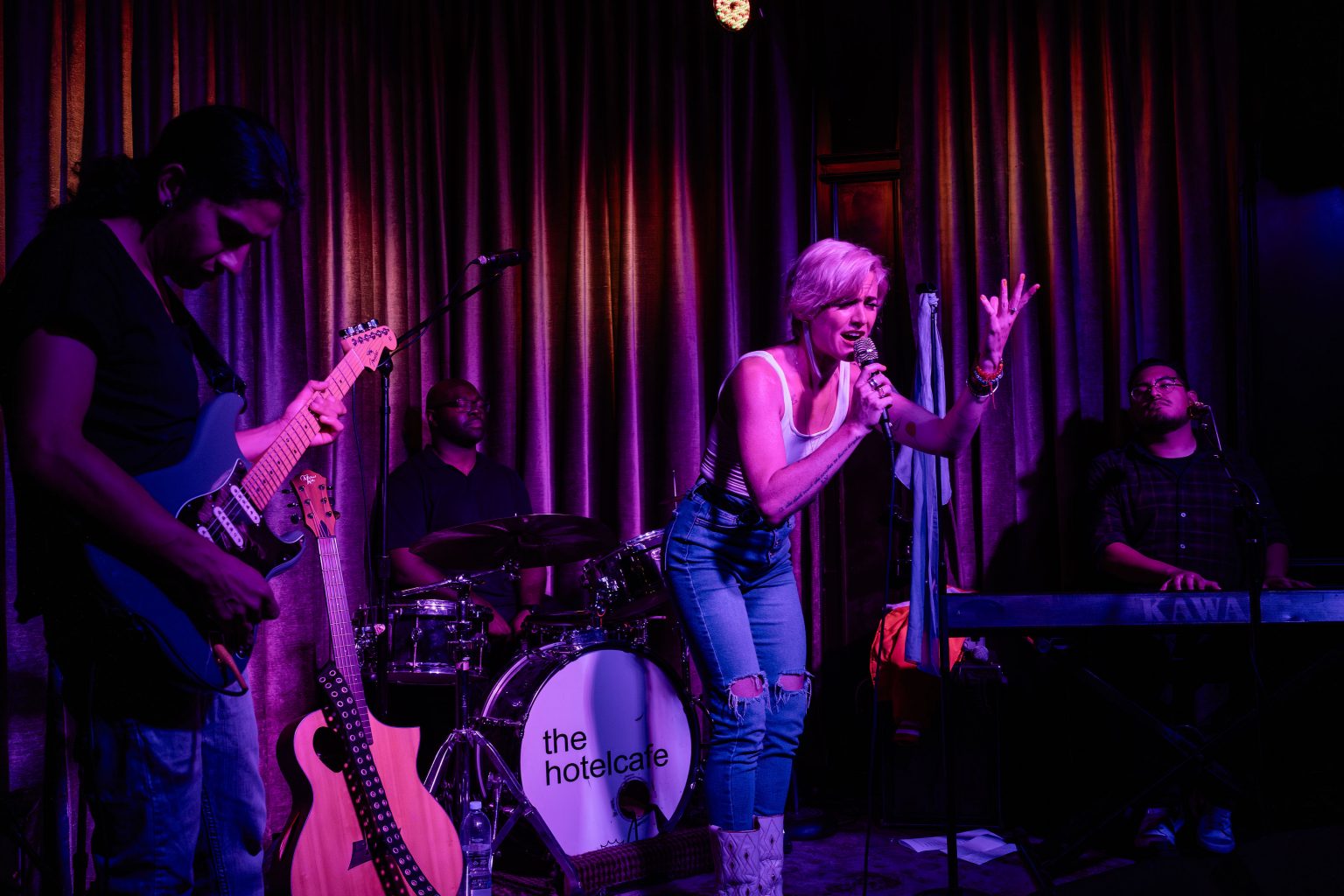
However, Hawkins’s musical journey is far from effortless. Amid personal challenges and adversity, she weaves her personal odyssey of pain and pleasure, transforming these experiences into empowering anthems.
In a candid interview with the Blade, Hawkins spoke with profound openness and vulnerability about her past struggles with opiate and heroin addiction: “That was 10 years ago that I struggled with opiates,” she shared. Yet, instead of letting her previous addiction define her, Hawkins expressed to the Blade that she harbors no shame about her past. “My newer music is much more about empowerment than recovery,” she explained, emphasizing that “writing was the best way to process trauma.”
Despite her struggles with addiction, Hawkins managed to recover. However, she emphasizes that this recovery is deeply intertwined with her spiritual connection to nature. An illustrative instance of Hawkins’ engagement with nature occurred during the COVID pandemic.
Following an impulse that many of us have entertained, she bought a van and chose to live amidst the trees. It was during this period that Hawkins composed the music for her second EP, titled “Lead with Love.”
In many ways, Hawkins deep spiritual connection to nature has been profoundly shaped by her extensive travels. Born in San Diego, spending her formative years in Massachusetts, and later moving to Tennessee before returning to Southern California, she has broadened her interests and exposed herself to the diverse musical landscapes across America.
“Music is the only thing I have left,” Hawkins confides to the Blade, highlighting the integral role that music has in her life. This intimate relationship with music is evident in her sultry and dynamic compositions. Rather than imitating or copying other artists, Hawkins effortlessly integrates sounds from some of her favorite musical influences to create something new. Some of these influences include LP, Lucinda Williams, Lana Del Rey, and, of course, Amy Winehouse, among others.
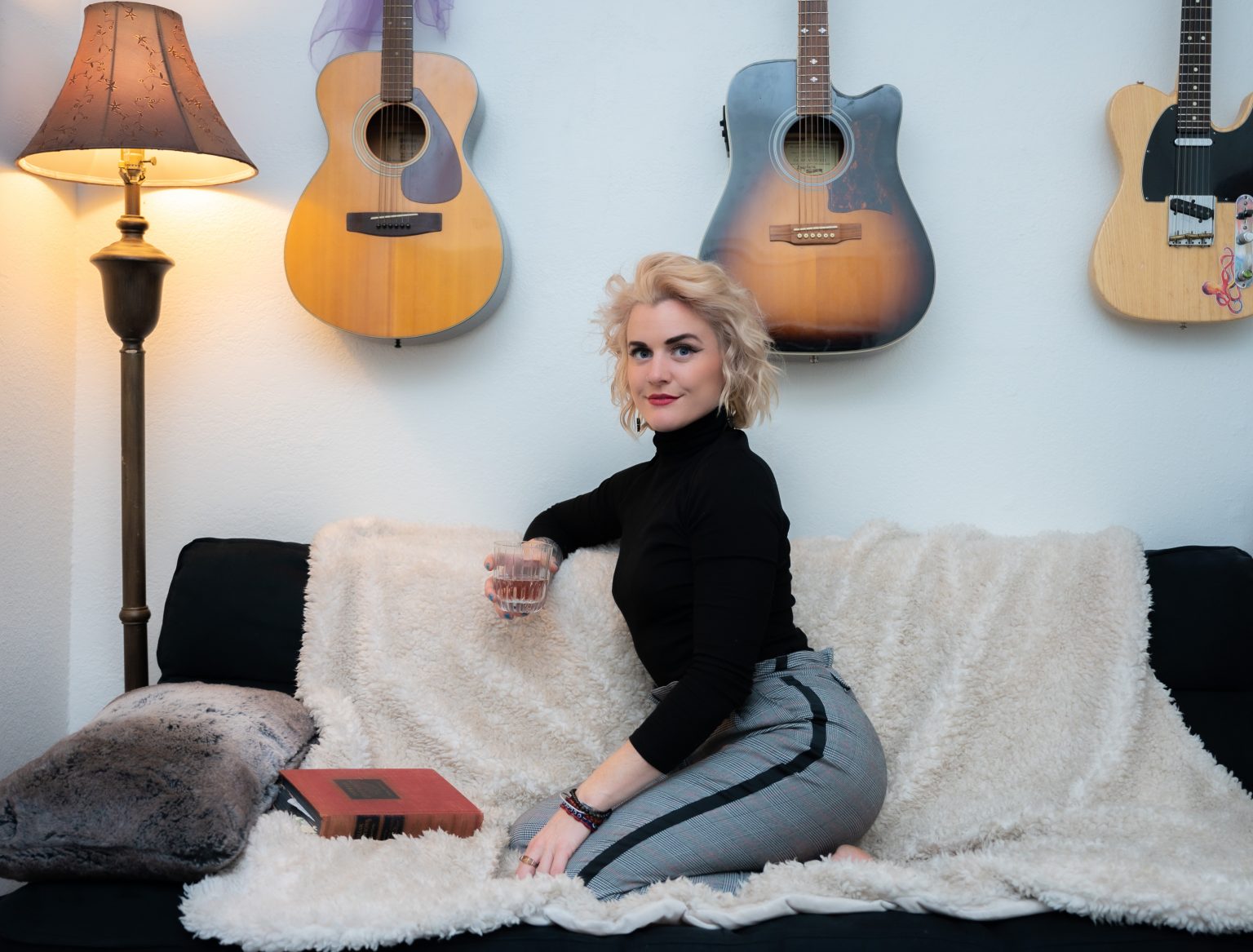
Hawkins has always been passionate about music—-she began with piano at a young age, progressed to guitar, and then to bass, eagerly exploring any instrument she could get her hands on. However, instead of following a traditional path of formalized lessons and structured music theory, Hawkins told the Blade that she “has a hard time following directions and being told what to do.”
This independent approach has led her to experiment with various genres and even join unexpected groups, such as a tribute band for Eric Clapton and Cream. While she acknowledges that her eclectic musical interests might be attributed to ADHD, she holds a different belief: “Creative minds like to move around.”
When discussing her latest musical release — “Stay True (the live album)” which was recorded in a live studio setting — Hawkins describes the experience as a form of improvisation with both herself and the band:
“[The experience] was this divine honey that was flowing through all of us.” She explains that this live album was uncertain in the music’s direction. “For a couple of songs,” Hawkins recalls, “we intuitively closed them out.” By embracing creative spontaneity and refusing to be constrained by fear of mistakes, the live album authentically captures raw sound, complete with background chatter, extended outros, and an extremely somber cover of Ozzy Osbourne’s “Crazy Train” coupled with a slow piano and accompanied strings.
While “Stay True” was a rewarding experience for Hawkins, her favorite live performance took place in an unexpected location—an unattended piano in the middle of an airport. As she began playing Beethoven’s “Moonlight Sonata”, Hawkins shared with the Blade a universal connection we all share with music: “This little girl was dancing as I was playing.”
After the performance, tears welled in Hawkins’ eyes as she was touched by the young girl’s appreciation of her musicianship. Hawkins tells the Blade, “It’s not about playing to an audience—it’s about finding your people.”
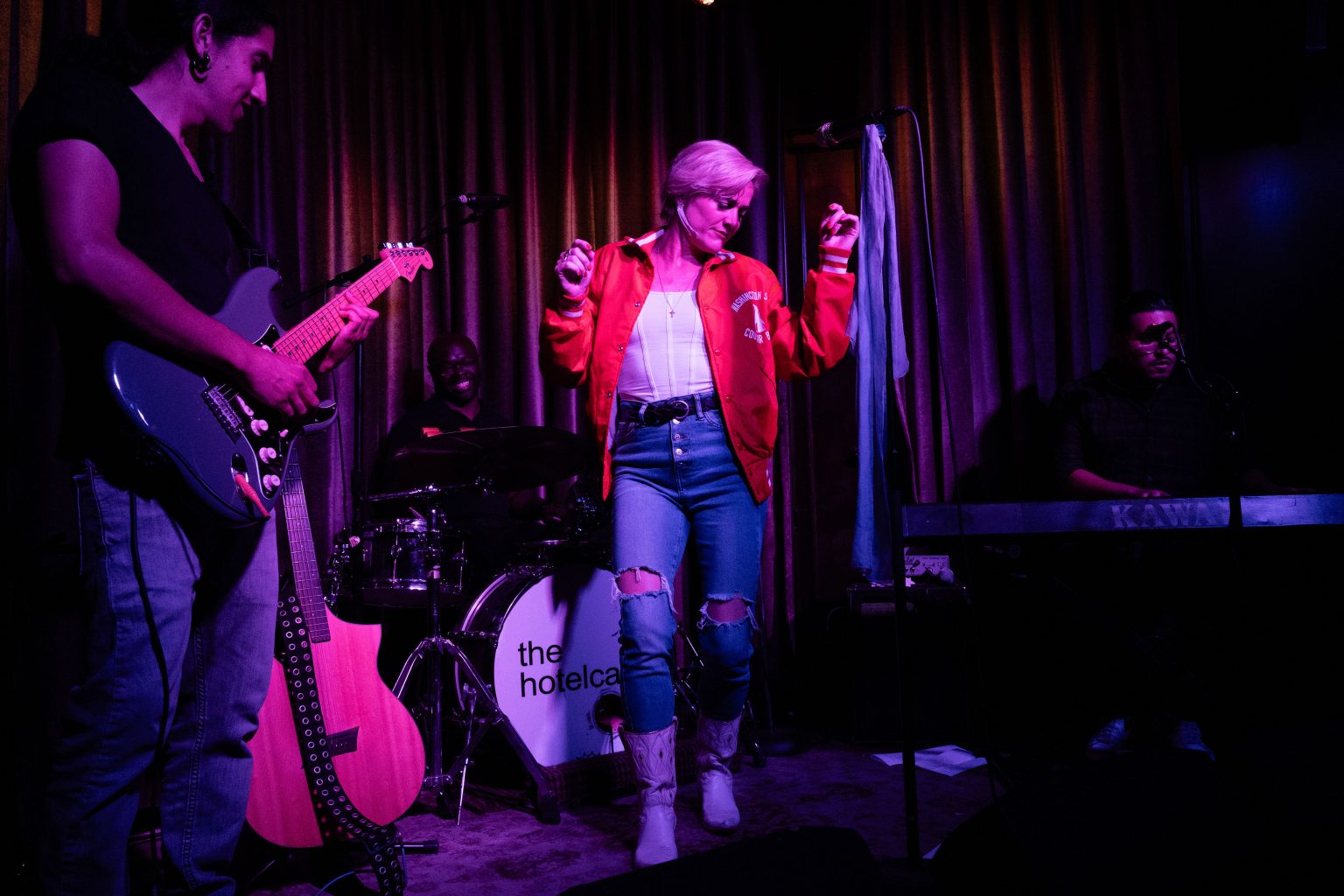
What sets Hawkins apart as an artist is her ability to connect with her audience in diverse settings. She highlights EDC, an electronic dance music festival, as a place where she unabashedly lets her “freak flag” fly and a place to connect with her people. Her affinity for electronic music not only fuels her original pop music creations, but also inspires her to reinterpret songs with an electronic twist. A prime example of this is with her electronic-style cover of Tal Bachman’s 90’s hit, “She’s So High.”
As an openly queer woman in the music industry, Hawkins is on a mission to safeguard artistic integrity. In songs like “My Father’s Men,” she bares her vulnerability and highlights the industry’s misogyny, which often marginalizes gender minorities in their pursuit of artistic expression.
She confides to the Blade, “The industry can be so sexist, misogynist, and oppressive,” and points out that “there are predators in the industry.” Yet, rather than succumbing to apathy, Hawkins is committed to advocating for gender minorities within the music industry.
“Luckily, people are rising up against misogyny, but it’s still there. ‘My Father’s Men’ is a message: It’s time for more people who aren’t just white straight men to have a say.”
Hawkins is also an activist for other causes, with a fervent belief in the preservation of bodily autonomy. Her self-directed music video “I’ll play Daddy,” showcases the joy of embracing one’s body with Hawkins being sensually touched by a plethora of hands. While the song, according to Hawkins, “fell upon deaf ears in the south,” it hasn’t stopped Hawkins from continuing to fight for the causes she believes in. In her interview, Hawkins encapsulated her political stance by quoting an artist she admires:
“To quote Pink, ‘I don’t care about your politics, I care about your kids.’”
When Hawkins isn’t writing music or being a champion for various causes, you might catch her doing the following: camping, rollerblading, painting, teaching music lessons, relaxing with Bernie (her beloved dog), stripping down for artsy photoshoots, or embarking on a quest to find the world’s best hollandaise sauce.
But at the end of the day, Hawkins sums up her main purpose: “To come together with like-minded people and create.”
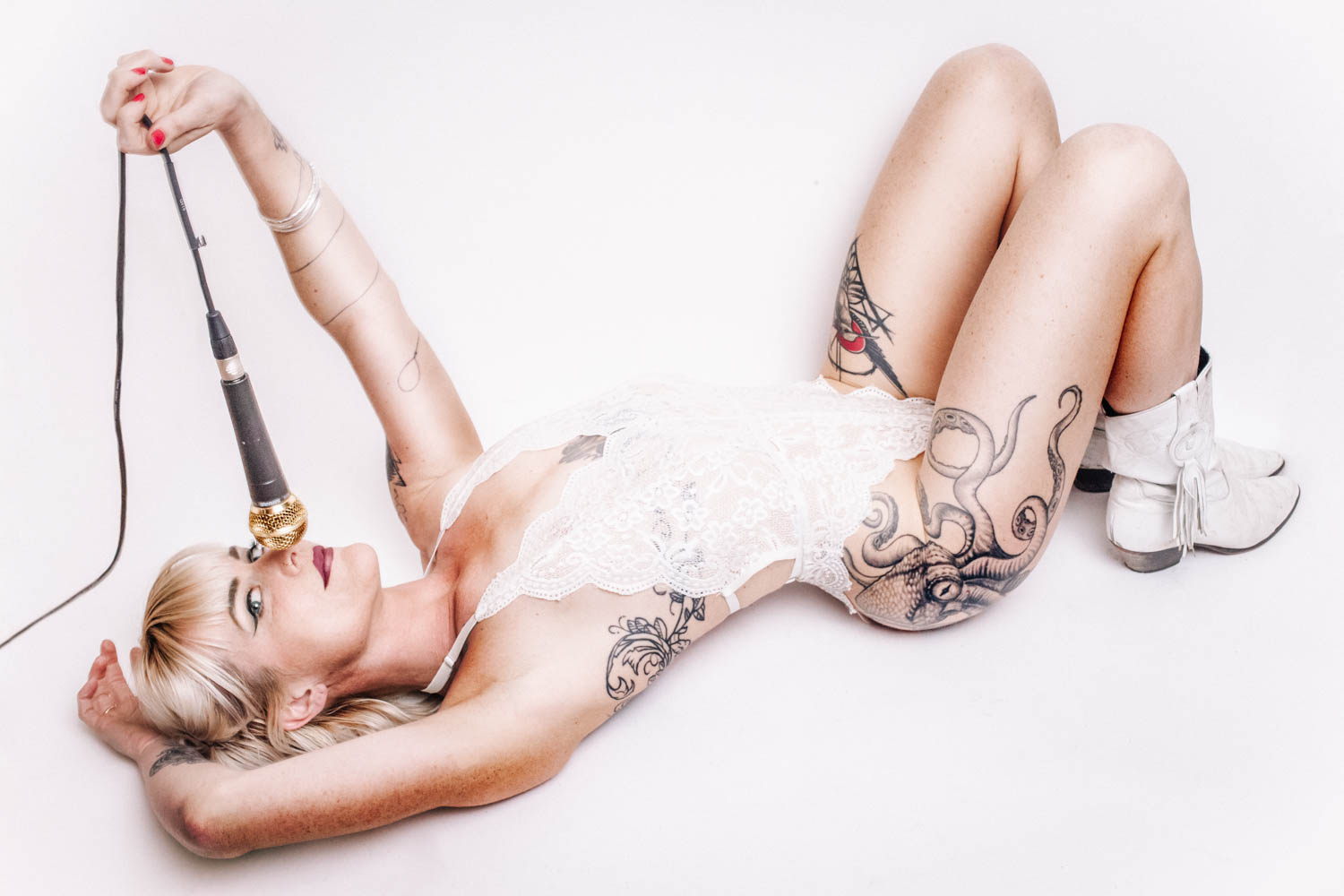
Part of this ever-evolving, coming-of-age-like journey includes an important element: plant-based medicine. Hawkins tells the Blade that she acknowledges her previous experience with addiction and finds certain plants to be useful in her recovery:
“The recovery thing is tricky,” Hawkins explains, “I don’t use opiates—-no powders and no pills—but I am a fan of weed, and I think psilocybin can be helpful when used at the right time.” She emphasizes the role of psychedelics in guiding her towards her purpose. “Thanks for psychedelics, I have a reignited sense of purpose … Music came naturally to me as an outlet to heal.”
While she views the occasional dabbling of psychedelics as a spiritual practice, Hawkins also embraces other rituals, particularly those she performs before and during live shows. “I always carry two rocks with me: a labradorite and a tiger’s eye marble,” she explains.
-

 State Department4 days ago
State Department4 days agoState Department releases annual human rights report
-

 South America2 days ago
South America2 days agoArgentina government dismisses transgender public sector employees
-

 District of Columbia2 days ago
District of Columbia2 days agoCatching up with the asexuals and aromantics of D.C.
-

 Politics5 days ago
Politics5 days agoSmithsonian staff concerned about future of LGBTQ programming amid GOP scrutiny












